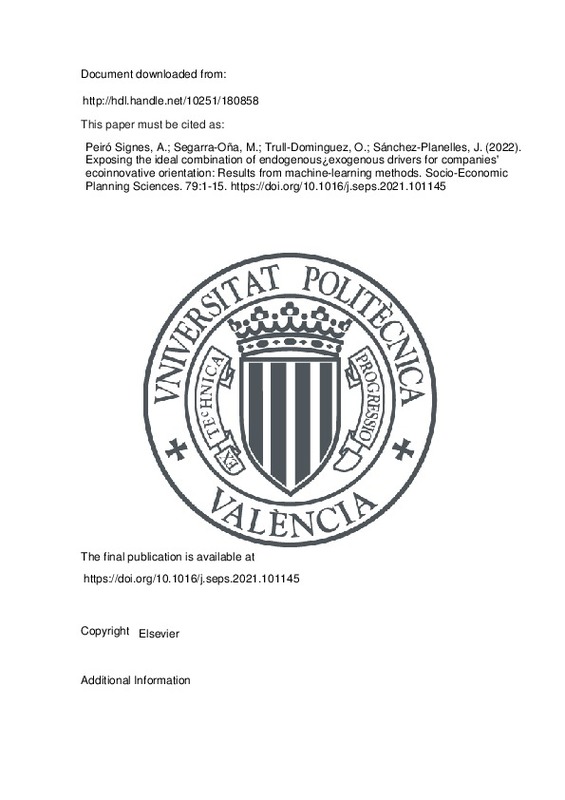JavaScript is disabled for your browser. Some features of this site may not work without it.
Buscar en RiuNet
Listar
Mi cuenta
Estadísticas
Ayuda RiuNet
Admin. UPV
Exposing the ideal combination of endogenous¿exogenous drivers for companies' ecoinnovative orientation: Results from machine-learning methods
Mostrar el registro sencillo del ítem
Ficheros en el ítem
| dc.contributor.author | Peiró Signes, Angel
|
es_ES |
| dc.contributor.author | Segarra-Oña, Marival
|
es_ES |
| dc.contributor.author | Trull-Dominguez, Oscar
|
es_ES |
| dc.contributor.author | Sánchez-Planelles, Joaquín
|
es_ES |
| dc.date.accessioned | 2022-02-15T19:03:42Z | |
| dc.date.available | 2022-02-15T19:03:42Z | |
| dc.date.issued | 2022-02-02 | es_ES |
| dc.identifier.issn | 0038-0121 | es_ES |
| dc.identifier.uri | http://hdl.handle.net/10251/180858 | |
| dc.description.abstract | [EN] This study provides an XGBoost model to characterize the environmental orientation of innovative firms. This novel approach, using state-of-the-art machine learning methodologies and multiple recognized drivers of eco-innovation, provides solid empirical support for the understanding of the mechanisms that are crucial for firms¿ transition to a low-carbon economy. Although many drivers have been considered to affect firms¿ eco-innovation, our feature selection process using the BorutaShap algorithm demonstrates that few aspects are truly relevant. Furthermore, analyzing a tree surrogate of the final model, our study explores the different paths or combinations of aspects that consistently lead to a specific eco-innovation orientation. The accuracy of the model and the large and complete spectrum of innovative companies in the sample contribute to the generalizability of the results. This study is particularly relevant because the main drivers of firms¿ eco-innovative orientation depend on their innovative behavior, indicating that the managerial and policy work has to be directed to raising awareness of the different externalities derived from innovation. On one side, policy regulations should continue to pressure firms with environmental standards. On the other side, managers can stimulate the creation of a corporate innovative culture oriented toward improving operational efficiency (reducing unnecessary costs), improving the workplace environment, and focusing on new customer demands, which, in essence, will guide the organization to be more environmentally and socially responsible | es_ES |
| dc.language | Inglés | es_ES |
| dc.publisher | Elsevier | es_ES |
| dc.relation.ispartof | Socio-Economic Planning Sciences | es_ES |
| dc.rights | Reconocimiento - No comercial - Sin obra derivada (by-nc-nd) | es_ES |
| dc.subject | Eco-innovation | es_ES |
| dc.subject | Drivers | es_ES |
| dc.subject | Innovative firms | es_ES |
| dc.subject | Machine learning | es_ES |
| dc.subject.classification | ORGANIZACION DE EMPRESAS | es_ES |
| dc.subject.classification | ESTADISTICA E INVESTIGACION OPERATIVA | es_ES |
| dc.title | Exposing the ideal combination of endogenous¿exogenous drivers for companies' ecoinnovative orientation: Results from machine-learning methods | es_ES |
| dc.type | Artículo | es_ES |
| dc.identifier.doi | 10.1016/j.seps.2021.101145 | es_ES |
| dc.rights.accessRights | Abierto | es_ES |
| dc.contributor.affiliation | Universitat Politècnica de València. Departamento de Organización de Empresas - Departament d'Organització d'Empreses | es_ES |
| dc.contributor.affiliation | Universitat Politècnica de València. Departamento de Estadística e Investigación Operativa Aplicadas y Calidad - Departament d'Estadística i Investigació Operativa Aplicades i Qualitat | es_ES |
| dc.description.bibliographicCitation | Peiró Signes, A.; Segarra-Oña, M.; Trull-Dominguez, O.; Sánchez-Planelles, J. (2022). Exposing the ideal combination of endogenous¿exogenous drivers for companies' ecoinnovative orientation: Results from machine-learning methods. Socio-Economic Planning Sciences. 79:1-15. https://doi.org/10.1016/j.seps.2021.101145 | es_ES |
| dc.description.accrualMethod | S | es_ES |
| dc.relation.publisherversion | https://doi.org/10.1016/j.seps.2021.101145 | es_ES |
| dc.description.upvformatpinicio | 1 | es_ES |
| dc.description.upvformatpfin | 15 | es_ES |
| dc.type.version | info:eu-repo/semantics/publishedVersion | es_ES |
| dc.description.volume | 79 | es_ES |
| dc.relation.pasarela | S\444378 | es_ES |
| dc.subject.ods | 08.- Fomentar el crecimiento económico sostenido, inclusivo y sostenible, el empleo pleno y productivo, y el trabajo decente para todos | es_ES |







![[Cerrado]](/themes/UPV/images/candado.png)

